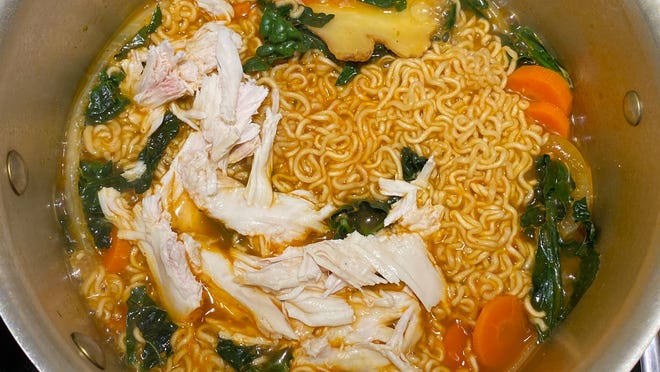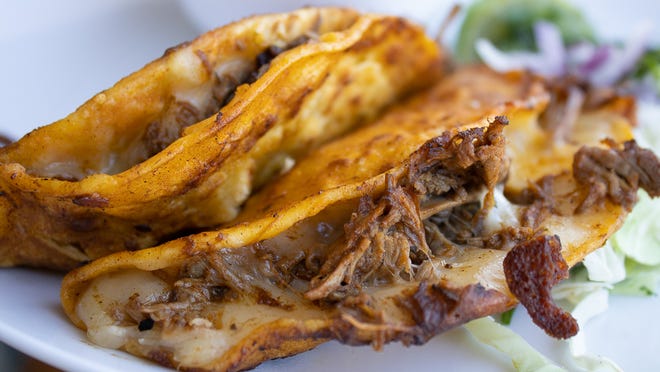Favorite Phoenix food stories of 2020

We made it. The new year is just around the corner.
But before we launch ourselves into 2021, a year that will hopefully bring some relief from the ferocity of the COVID-19 pandemic, we wanted to take a look back at some of the bright moments from this year. Because there were indeed some bright spots despite the deaths of thousands of Arizonans, swelling unemployment and numerous other ways the virus has impacted our state.
These are stories of individuals and businesses around Arizona who lent helping hands when others were struggling. They are stories of how food brought people together during time when we were unable to be physically close. They are stories about resilience in the face of adversity and more.
Here are 10 of our favorite food and drink stories from around metro Phoenix in 2020.
Armato shares tips for giving instant ramen a glow-up
As the coronavirus pandemic turned the world upside down and restaurants across the country shuttered to switched to takeout only, former Arizona Republic dining critic Dominic Armato found himself finding new ways to guide diners to their next great meal. He took it in stride, at one point penning a story about how to dress up a bowl of instant ramen. And if the primer wasn’t enough, he also spilled the beans about a mail order ramen that’s not just passable, but dining critic approved.
— Lauren Saria
O.H.S.O. steps up to bring hand sanitizer to health care workers
In March, one metro Phoenix brewery and distillery shifted gears drastically. Instead of brewing beer and distilling spirits, the team at O.H.S.O. Brewing and Distilling decided they would make hand sanitizer for Banner Health. O.H.S.O. operations manager Adam Davis led the project. “It was surreal and unbelievable yesterday,” Davis told The Republic. “They were there with open arms and working quickly.” One moment in particular made him laugh, and stuck with me months later. Recounting the first sanitizer delivery to hospital workers, Davis described how the O.H.S.O. team delivered the sanitizer in kegs. Davis was then tasked with teaching a group of doctors and nurses the important skill of tapping it correctly so as not to waste the precious resource.
— Tirion Morris
Cartel Coffee rallies to support racial justice

As protests fighting for racial justice swept the country, one coffee local roaster wondered how she could help. Lisette Barbera is the production supervisor at Tempe-based company Cartel Coffee Lab. She pitched the idea of selling a specialty coffee, packaged in solid black bags, to raise money for Black Lives Matter Phoenix Metro. “I didn’t know how to work an Excel sheet, I don’t know the jargon or the way that sales work,” she told The Republic. “I know how to roast coffee.” But with a little help and a solid idea, the team at Cartel rallied to make the project a reality and ended up donating not just the proceeds, but all of the sales from the coffee to the racial justice organization.
— Tirion Morris
Black farmers find a ‘peaceful space’ in this south Phoenix garden
40 Akers and Project Roots are two organic farm groups operating out of Spaces of Opportunity, a community garden in south Phoenix. They are also two of the few farm groups in metro Phoenix run predominantly by Black women. The name 40 Akers comes from the “40 acres and a mule” the federal government promised to give freed slaves. Both groups are trying to solve problems exacerbated by systemic racism, which researchers say are responsible for the south Phoenix food deserts and national decline in Black farm ownership. Their efforts include making local foods more accessible, erasing the stigma that healthy food has to be expensive, and creating a more inclusive space in agriculture. “A lot of us we need a peaceful space in this very hectic world,” said 40 Akers farmer Jordanne Dempster. “Peace, that’s a revolution in itself.”
— Priscilla Totiyapungprasert
Mesa restaurant becomes a hub for donations to tribal communities
When Marco Meraz started collecting groceries for a friend’s family living on the Navajo Nation, he didn’t predict his restaurant would become the hub for a weeks-long donation drive to help native communities. But when the dining room at his family’s Mesa restaurant Republica Empanada stayed closed, Meraz dedicated the space to collecting supplies. Each weekend, he and a team of friends and volunteers would make the drive north to bring donations to Arizona’s tribal lands. Through his efforts, Meraz connected with strangers on the Navajo and Hopi reservations and with members of the San Juan Southern Paiute Tribe. In a time where separation is necessary, these donation drives fostered a new connection; those who donated groceries were able to provide food and comfort to communities hundreds of miles away.
— Tirion Morris
Phoenix chefs redefine authenticity with Filipino food
There was a period when it seemed like everyone from the casual diner to the aggressive Yelp reviewer thought they were an authority on what immigrant food is supposed to be like: often cheap and the ever-loaded “authentic.” During Filipino American Heritage Month, three chefs with immigrant parents shared how they’re using traditional flavors and ingredients — and creating something new inspired by their own identities. There’s John Cornelio’s arroz caldo with shrimp and crab butter, a nod to his family’s history working at an Alaskan seafood cannery. There’s the ube poptart from baker Jasmine Gayongala, who learned to mix cuisines from her own parents’ pasta experiments. There’s Kevin Rosales’ longsilog siopao burger, a collaboration with buddy Justin Jin Park who wanted to open an Asian bun concept. As these chefs show: Authenticity is about lived experiences.
— Priscilla Totiyapungprasert
Phoenix heroes work hard to keep kids fed during COVID-19

As they say, it takes a village, and that certainly felt true when it came to feeding children during the school year in the middle of a pandemic: from the lunch workers who masked up for a new takeout model to the school bus drivers who delivered meals to the helpful neighbors who simply picked up meals when other parents couldn’t. This summer the federal government ended a food service program that allows public school districts to give subsidized meals to anyone under 19, before reinstating it now through June 30. The time without the program came at a cost, however, and school employees spoke candidly about what’s a stake for both the children and staff when meal numbers drop.
— Priscilla Totiyapungprasert
She quit her job and opened a successful birria restaurant
We can’t know for sure, but it seems safe to assume that fewer restaurants opened this year due to the uncertainty brought on by the COVID-19 pandemic. But that didn’t stop The Arizona Republic’s Shaena Montanari from exploring new takeout options as a part of our occasional series Take Me Out. One of my favorite editions told the story of Jazmin Sears, who quit her job to focus on her catering business earlier this year and ultimately opened AZ Taco King restaurant. The small taco shop was an immediate hit, drawing long lines of customers wanting to try her quesabirria tacos dipped in delicate consomé, a prime example of how simple, good food can triumph despite even the tallest odds.
— Lauren Saria
Phoenix gay bars host uniquely 2020 gatherings on election night
This November at Phoenix gay bars Stacy’s at Melrose, The Rock and Kobalt, owners worked to create socially distant environments where a community acutely impacted by the results of the election, could gather and celebrate or commiserate together. The events at Stacy’s went one step further, lightening the mood and providing some relief from an anxiety-filled night with a drag show and politically themed performances. The photographs of the event are some of my favorite of this year. Drag queens performed with face masks and shields incorporated into their outfits as CNN’s John King tallied election returns on a red and blue map in the background.
— Tirion Morris
Salvadoran immigrants find community through food
From 1979 to 1992, the U.S. government abetted the the Salvadoran Civil War. In 2001 two earthquakes destroyed or damaged more than hundreds of thousands of homes in El Salvador. In 2020 a network of Salvadoran restaurants in metro Phoenix faced a pandemic, and struggled to keep their community gathering spots and livelihoods intact. As at least a few restaurant owners show, all these stories are connected and food is just one of the things that brings a community together in a new home.
— Priscilla Totiyapungprasert
Reach the reporter at [email protected]. Follow her on Instagram at laurensaria, on Twitter at lhsaria and on Facebook at facebook.com/lsaria.
Support local journalism and subscribe to azcentral.com today.











